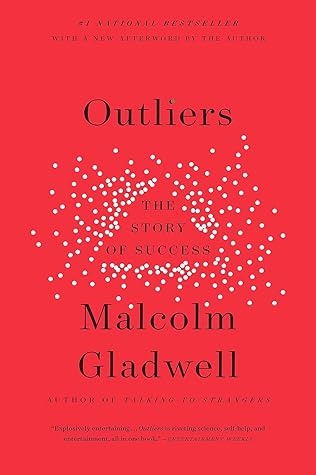More on this book
Community
Kindle Notes & Highlights
there is something profoundly wrong with the way we make sense of success.
People don’t rise from nothing. We do owe something to parentage and patronage.
It makes a difference where and when we grew up. The culture we belong to and the legacies passed down by our forebears shape the patterns of our achievement in ways we cannot begin to imagine. It’s not enough to ask what successful people are like, in other words. It is only by asking where they are from that we can unravel the logic behind who succeeds and who doesn’t.
the closer psychologists look at the careers of the gifted, the smaller the role innate talent seems to play and the bigger the role preparation seems to play.
the people at the very top don’t work just harder or even much harder than everyone else. They work much, much harder.
Ten thousand hours is the magic number of greatness.
Practice isn’t the thing you do once you’re good. It’s the thing you do that makes you good.
Intelligence has a threshold.
If intelligence matters only up to a point, then past that point, other things—things that have nothing to do with intelligence—must start to matter more.
They lacked something that could have been given to them if we’d only known they needed it: a community around them that prepared them properly for the world.
Successful people don’t do it alone. Where they come from matters. They’re products of particular places and environments.
We tell rags-to-riches stories because we find something captivating in the idea of a lone hero battling overwhelming odds.
But as is so often the case with outliers, buried in that setback was a golden opportunity.
what your parents do for a living, and the assumptions that accompany the class your parents belong to, matter.
Hard work is a prison sentence only if it does not have meaning.
if you work hard enough and assert yourself, and use your mind and imagination, you can shape the world to your desires.
Success is not a random act. It arises out of a predictable and powerful set of circumstances and opportunities,
Their world—their culture and generation and family history—gave them the greatest of opportunities.
that’s what a “culture of honor” means. It’s a world where a man’s reputation is at the center of his livelihood and self-worth.
Cultural legacies are powerful forces. They have deep roots and long lives. They persist, generation after generation, virtually intact, even as the economic and social and demographic conditions that spawned them have vanished, and they play such a role in directing attitudes and behavior that we cannot make sense of our world without them.*
the United States is also the only industrialized country in the world that does not provide its citizens with universal health care.
Each of us has his or her own distinct personality. But overlaid on top of that are tendencies and assumptions and reflexes handed down to us by the history of the community we grew up in, and those differences are extraordinarily specific.
Who we are cannot be separated from where we’re from—and
“NO ONE WHO CAN RISE BEFORE DAWN THREE HUNDRED SIXTY DAYS A YEAR FAILS TO MAKE HIS FAMILY RICH.”
Asian children learn to count much faster than American children. Four-year-old Chinese children can count, on average, to forty. American children at that age can count only to fifteen, and most don’t reach forty until they’re five. By the age of five, in other words, American children are already a year behind their Asian counterparts in the most fundamental of math skills.
“If God does not bring it, the earth will not give it” is a typical Russian proverb.
“If a man works hard, the land will not be lazy.”
Schools work. The only problem with school, for the kids who aren’t achieving, is that there isn’t enough of it.
For its poorest students, America doesn’t have a school problem. It has a summer vacation problem,
Outliers are those who have been given opportunities—and who have had the strength and presence of mind to seize them.
The world could be so much richer than the world we have settled for.
Sexual relations between whites and blacks were considered morally repugnant. Laws were passed prohibiting miscegenation, the last of which were not struck down by the US Supreme Court until 1967.


